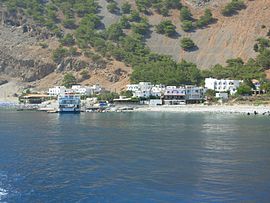Agia Roumeli (Greek: Αγιά Ρούμελη) is a small village in southwest Crete, Greece. It consists of two parallel streets along the water, with several restaurants and souvenir shops.[2] There is an old fortress, called Castle Agia Roumeli, that sits on top of a hill to the west of the village.[3]
Agia Roumeli
Αγία Ρουμέλη | |
|---|---|
 View of Agia Roumeli from the ferry | |
| Coordinates: 35°13′48″N 23°57′37″E / 35.23000°N 23.96028°E | |
| Country | Greece |
| Administrative region | Crete |
| Regional unit | Chania |
| Municipality | Sfakia |
| Population (2021)[1] | |
• Community | 78 |
| Time zone | UTC+2 (EET) |
| • Summer (DST) | UTC+3 (EEST) |
| Website | www |
Geography
editAgia Roumeli sits at the exit of the Samaria Gorge and a 16 kilometer hiking path from the mountainous inland region.[2]
History
editAgia Roumeli was originally known as Tarra, an ancient city-state referenced by Homer in the Iliad as one of the Hundred Cities of Greece. In 1867, Turkish soldiers landed on Crete and attempted to move up the Samaria Gorge. They failed to reach it, but did burn down the town of Agia Roumeli.[3]
Ecology
editNear the village on Fournoti beach is a plant micro-reserve for the rare shrub Hypericum aciferum. The reserve covers approximately 6.5 hectares and contains more than a hundred plants of the vulnerable species.[4]
References
edit- ^ "Αποτελέσματα Απογραφής Πληθυσμού - Κατοικιών 2021, Μόνιμος Πληθυσμός κατά οικισμό" [Results of the 2021 Population - Housing Census, Permanent population by settlement] (in Greek). Hellenic Statistical Authority. 29 March 2024.
- ^ a b A.E, Corissia Hotels-I. Tsiledakis. "The breathtaking Samaria Gorge in Crete is spectacular – but it is not tame". Corissia Hotels - I.Tsiledakis A.E. Retrieved 2024-04-05.
- ^ a b Kenny, Stuart (8 March 2022). "How Samaria Gorge in Crete Became a Haven for Freedom Fighters". Much Better Adventures. Retrieved 5 April 2024.
- ^ Thanos, Costas; Fournaraki, Christini; Georghiou, Kyriacos; Dimopoulos, Panayotis (2013). "PMRs in western Crete" (PDF). Plant Micro-Reserves: From Theory to Practice. Utopia Publishing. ISBN 978-618-80647-2-0.
